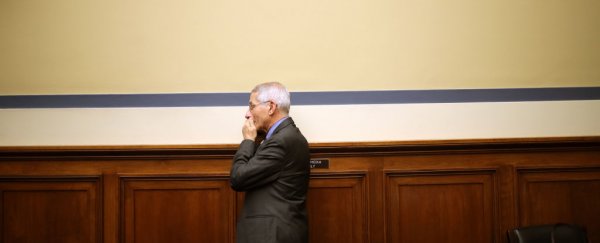Anthony Fauci, director of the National Institute of Allergy and Infectious Diseases (NIAID), warned members of the incoming Trump administration in January 2017 about the inevitability of a "surprise outbreak" of a new disease. He said at the time that the US needed to do more to prepare.
"There is no question that there will be a challenge to the coming administration in the arena of infectious diseases," Fauci said during a speech at Georgetown University, adding, "the thing we're extraordinarily confident about is that we're going to see this in the next few years."
Fauci specifically singled out the risks posed by unknown diseases, in addition to those from existing or re-emergent ones. Fighting infectious diseases, he said, is a "perpetual challenge".
Responses to past outbreaks like Zika and HIV/ AIDS offer lessons for the incoming administration, Fauci added; he has led NIAID since 1984 and advised six US presidents on public-health crises.
"The history of the last 32 years that I've been the director of NIAID will tell the next administration that there's no doubt in anyone's mind that they will be faced with the challenges that their predecessors were faced with," he said.
Fauci called on the Trump administration to prepare the US for such challenges before they arise, by improving global health-surveillance systems, investing in research, and setting aside emergency funds.
"We do need a public-health emergency fund. It's tough to get it… but we need it," Fauci said.
"Because what we had to go through for Zika – it was very, very painful when the president asked for the US$1.9 billion in February and we didn't get it until September."
But the Trump administration did not create such a fund, and instead cut spending for federal agencies responsible for detecting and preparing for outbreaks.
In May 2018, Trump's national security advisor disbanded the National Security Council's pandemic response team, while in October 2019, the administration declined to renew funding for a pandemic early warning system.
Throughout January, February, and March of this year, Trump downplayed the outbreak in the US, saying, "we have it totally under control", "it will disappear", and, "America will again and soon be open for business".
However, Fauci and other top government officials – including health secretary Alex Azar and trade adviser Peter Navarro – have painted a more sobering picture.
In congressional hearings and public press briefings, Fauci has repeatedly contradicted Trump's positive narrative, which has at times seemed to frustrate the president.
Trump recently retweeted a call from a Republican congresswoman to fire Fauci after he said the US's slow response to COVID-19 has cost lives.
This article was originally published by Business Insider.
More from Business Insider:
